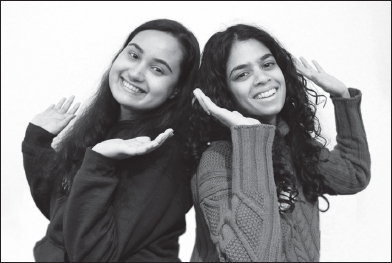
FAIZA KHANOM
YEARS AS MENTEE: 2
GRADE: Senior
HIGH SCHOOL: The Baccalaureate School for Global Education
BORN: Sreemangal, Bangladesh
LIVES: Queens, NY
MENTEE’S ANECDOTE: Meeting with Nandita after school is a joy. Every week, I look forward to the safe space that we create during our pair sessions. I forget about the stress from my responsibilities of school and home. We connect over our South Asian heritage and in finding ways to buy more affordable Indian clothing. She has helped in finding my natural voice in my writing. This year, we have tackled vulnerable topics. I have written words that I have not expressed to my friends and family. I am grateful for finally giving a voice to my stories and having them in existence.
NANDITA RAGHURAM
YEARS AS MENTOR: 3
OCCUPATION: Editor, Mashable
BORN: Chicago, IL
LIVES: Brooklyn, NY
PUBLICATIONS AND RECOGNITIONS: The Village Voice, Mashable, Vox
MENTOR’S ANECDOTE: I love meeting with Faiza every week in Manhattan, but by far my favorite moment of the year was when Faiza and I finished her college essay. It was an incredible piece of writing and she utilized all the things we had discussed about writing for the past two years: sensory descriptions, casual voice, and tone. I was so proud of her work and of her.
My uncle approached my parents with a marriage proposal for me when I was fifteen. This is my story.
I smelled the aroma of samosas in my bedroom while I worked on my homework. I sprinted and followed the scent, which led me to the kitchen. My mother rushed from the fridge to the counter while holding the telephone against her ear.
“Faiza, can you check the salt for this, and the samosas are on the table,” she told me.
My mom was speaking with my aunt. She suddenly slammed the oak kitchen door. Her voice was very raspy, which surprised me, because they speak almost every day and this had never happened.
“How can he even propose the idea? She’s only fifteen,” she screamed over the phone, then hung up.
My heart started racing. I was fifteen at the time, which is the age when women in South Asian households are married off. I had a feeling that my mom and my aunt were talking about a marriage proposal for me. For the next few days, she and my father would speak in a low tone when I was around. Or they would send me off for an errand, so they could be alone and talk about me. I would catch them murmuring the word “marriage.”
I was disgusted at the fact that my uncle would try to set me up with a husband. My uncle, a man who had been living in the United States for more than thirty years, was still upholding this tradition.
It never went any further than that, fortunately. As I grow older, though, older family members will question me as to why I am not married yet, and my mom will not always be there to stand up for me. While I was lucky, not many women are. Today one in five girls are married before the age of eighteen.
For example, my cousin who lives in Woodside, Queens, is a pharmacist. Her father died in 2011. Since then, she’s taken care of her four younger siblings and her mourning mother. She’s twenty-eight years old and has family pushing her to get married. During family gatherings, my aunts constantly nag her about looking for a potential husband. She just ignores them.
My friend told me a story about her cousin in India who was seventeen and reaching the age of marriage. When men would come with marriage proposals, her mom would load her face with pounds of makeup in order to make her skin appear lighter and more attractive. I imagine her cousin searching through recipes just like the girls in Indian soap operas. I imagine her carrying the tray of food to the guests while her hands trembled. Résumés and profiles of men would be placed on top of her textbooks. I imagine that if she got married, she wouldn’t be able to graduate from high school.
My friend told me that when the proposals would get rejected by the potential husbands, her cousin’s mother would say, “It’s not our fault, she’s just ugly.” This is the reality for many young girls around the world.
This epidemic has to change. Women are not born to get married and have babies. The only way to prevent this is to change people’s mind-set just like the way my mom educated my uncle.
Today I am seventeen years old and I will be attending college this fall. This is my way of challenging the system.